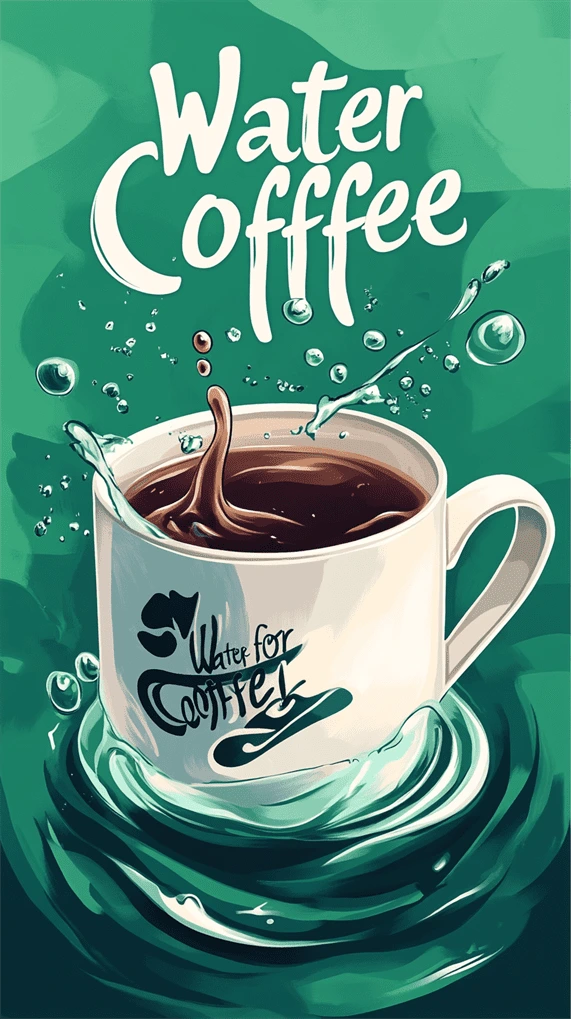The Hidden Ingredient: How Water Quality Shapes Your Coffee Taste
Table of Contents
🌊 Intro: It’s More Than Just the Beans
When we talk coffee quality, most people think about the beans, the roast, or the fancy gear. But here’s the hidden truth: coffee is 98% water 💦. So if your water quality is poor, your cup won’t shine—no matter how premium your beans are.
Understanding how water chemistry shapes flavor can instantly level up your brew. From hardness to pH, let’s dive in. 🧪☕
💡 Why Water Is Crucial in Coffee Brewing

Water isn’t just a liquid—it’s your main ingredient. Great water extracts flavors properly, enhances sweetness, and creates balance. Bad water? It can distort the taste, cause over-extraction, or introduce weird notes like chlorine or metal. 🧂🚫
Water impacts:
☕ Extraction of coffee compounds
🌱 Brightness and sweetness
🧊 Mouthfeel and body
🛠️ Your machine’s health (minerals = limescale)
🔬 What’s in Your Water? Let’s Break It Down
| Element | Effect on Coffee | Good or Bad? |
|---|---|---|
| Calcium & Magnesium | Helps extraction, adds depth | ✅ Great in moderation |
| Bicarbonate (Alkalinity) | Neutralizes acids, may dull flavor | ⚠️ Too much can flatten taste |
| Sodium | Adds roundness, can overpower | ⚠️ Low levels only |
| Chlorine & Chloramine | Off-taste, chemical reaction | ❌ Avoid at all costs |
| Iron & Copper | Metallic taste, machine damage | ❌ Not good |
| pH (~6.5–7.5 ideal) | Impacts acidity and balance | ✅ Neutral is best |
🧪 Hard Water vs. Soft Water: Which Is Better?
People often think soft water is the way to go. But ultra-pure water (like distilled or reverse osmosis) lacks essential minerals—meaning it can’t extract coffee flavors properly.
🧱 Hard Water
✅ Boosts sweetness and full body
❌ Can cause limescale buildup
⚠️ Excess = bitter, astringent taste
🌫️ Soft Water
✅ Kind to your coffee gear
❌ Lacks calcium/magnesium = flat brews
⚠️ Can taste weak or sour
📢 The sweet spot is balanced water, not extremes 🧘
🔧 What’s the Ideal Water for Brewing? The Gold Cup Standard
The Specialty Coffee Association (SCA) has guidelines for perfect brewing water:
| Parameter | Recommended Range |
|---|---|
| Total Dissolved Solids | 75–250 ppm |
| Calcium Hardness | 50–175 ppm |
| Alkalinity | 40 ppm |
| pH | 6.5–7.5 |
| Sodium | <10 ppm |
| Chlorine | 0 ppm (must be filtered) |
📝 Use a water testing kit or TDS meter to check your water at home.
🏠 How to Improve Your Coffee Water at Home
✅ Filter It
A basic carbon filter (like Brita or Soma) removes chlorine and metals. A simple but effective upgrade.
✅ Use Third Wave Water
These mineral packs turn distilled water into perfect brewing water. Great for precision brewers.
✅ Remineralize RO Water
If you’re using reverse osmosis water, add minerals back to improve flavor and extraction.
✅ Choose Spring Water
Some bottled spring waters are well-balanced—look for ones with calcium and magnesium.
🌍 World Water Profiles: How Geography Affects Your Brew
| City | Water Type | Impact on Coffee |
|---|---|---|
| Seattle | Soft, low minerals | Clean but can be sour or thin |
| London | Hard water | Strong body, may mute acidity |
| New York | Medium-soft | Balanced—great for most brews |
| Tokyo | Very soft | Light, delicate—but may under-extract |
📍 Where you live plays a huge role in how your coffee tastes!
☕ Bad Water = Bad Flavor: What to Watch For
| Water Issue | Taste Problem |
|---|---|
| Chlorine or chloramine | Chemical, pool-like aftertaste |
| High hardness | Over-extracted, bitter |
| Water too soft or pure | Weak, underwhelming flavor |
| Low alkalinity | Too acidic or sharp |
| Wrong pH | Either dull or overly tangy |
⚠️ Espresso Machines Need Extra Caution
What’s good for your pour-over might wreck your espresso machine.
🔧 Minerals = scale buildup
💰 Expensive repairs
📄 May void warranty without filtration
👉 Use espresso-friendly filters or bottled water specifically made for machines.
🎯 Pro Tips to Level Up Your Water (and Coffee)
✔️ Always start with filtered water
✔️ A TDS meter helps you measure the mineral levels in your water accurately.
✔️ Target pH near 7 for balance
✔️ Don’t go too hard or too soft—aim for mineral balance
✔️ Test different water sources—you’ll taste the difference!
📌 Final Takeaway: Don’t Overlook Your Water 💧
We spend hours dialing in beans, grind size, and gear. But if your water’s not right, you’re missing half the equation.
Next time your coffee tastes off, don’t be too quick to fault the beans. Check your water. It might be the most important ingredient of all! 💡☕💦

